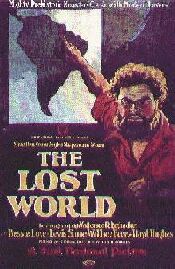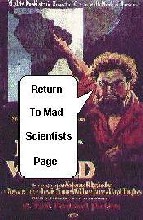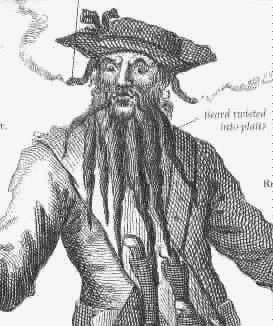Professor George Edward Challenger:
'Caveman in a Lounge Suit'
"Truth is truth, and the noise of a number of foolish young men--and, I fear I must add, of their equally foolish seniors--cannot affect the matter."- Prof. Challenger.

Professor George Edward Challenger:
'Caveman in a Lounge Suit'
"Truth is truth, and the noise of a number of foolish young men--and, I fear I must add, of their equally foolish seniors--cannot affect the matter."- Prof. Challenger.

"As I entered, his seat spun round to face me. His appearance made me gasp. I was prepared for something strange, but not for so overpowering a personality as this. It was his size which took one's breath away--his size and his imposing presence. His head was enormous, the largest I have ever seen upon a human being... He had the face and beard which I associate with an Assyrian bull; the former florid, the latter so black as almost to have a suspicion of blue, spade-shaped and rippling down over his chest... The eyes were blue-gray under great black tufts, very clear, very critical, and very masterful. A huge spread of shoulders and a chest like a barrel were the other parts of him which appeared above the table, save for two enormous hands covered with long black hair. This and a bellowing, roaring, rumbling voice made up my first impression of the notorious Professor Challenger."--From The Lost World by Sir Arthur Conan Doyle
George Edward Challenger- explorer, zoologist, biologist, chemist, physicist, spiritualist. The man who found living dinosaurs in South America, prevented the Bolsheviks from acquiring disintigration technology and, in one of the most splendid acts of Scientific hubris ever, proved that the Earth is itself a living organism.
Challenger's co-biographers, Sir Arthur Conan Doyle1. , Edward Mallone and Peerless Jones detailed five of the Professor's remarkable adventures, beginning in 1913. In the first of these stories The Lost World, the Challenger's career is summarised as follows:
'Challenger, George Edward. Born: Largs, N. B., 1863. Educ.: Largs Academy;Edinburgh University. British Museum Assistant, 1892. Assistant-Keeper of Comparative Anthropology Department, 1893. Resigned after acrimonious correspondence same year. Winner of Crayston Medal for Zoological Research. Foreign Member of'--well, quite a lot of things, about two inches of small type--Societe Belge, American Academy of Sciences, La Plata, etc., etc. Ex-President Palaeontological Society. Section H, British Association'--so on, so on!-- Publications: "Some Observations Upon a Series of Kalmuck Skulls"; "Outlines of Vertebrate Evolution"; and numerous papers, including "The underlying fallacy of Weissmannism," which caused heated discussion at the Zoological Congress of Vienna. Recreations: Walking, Alpine climbing. Address: Enmore Park, Kensington, W.'
Potentially, Challenger could have been as well known and admired as his contemporaries, Edison, Curie or Einstein, were it not that he had so little regard for the opinions of others. Like the best of Mad Scientists, Challenger had no time for the accepted theories of the scientific orthodoxy. But unlike many Mad Scientist, Challenger never fled from their disdain, prefering instead to revel in it. His many patents made him independantly wealthy, so he had nothing to lose by making war upon his fellow academics- though one suspects that he would have taken them on even if he did. Envious of his talent, and angered by his arrogant, bullying, supercillious and outright ferocious manner, Challenger's many scientific opponants never missed a chance to attack his more implausable theories. That these theories inevitably proved correct can only have added to the bitterness.
But Challenger had allies as well- his wife, Jessie and daughter, Enid; reporter Edward Mallone, who later marries Enid; Prof. Summerlee, a scientific opponant who is converted to Challenger's camp at the sight of live dinosaurs in South America; and Lord John Roxton, a sporting gentleman and part time vigilante abolitionist. And it has to be said, that in spite of his aggravating and violent demeanor, the Professor is a good hearted man underneath.
As mentioned above, of the Professor's many adventures, only five have been published in fictionalised accounts, The Lost World, The Poison Belt, The Land of Mists, The Disintegration Machine and When the World Screamed. To my mind the best of these are When the World Screamed and, of course The Lost World, which has been filmed three times, in 1925, 1960, and 1992 2. Lost World is a rollicking yarn of daring do and dinosaurs, as Challenger, Mallone, Summerlee and Roxton find iguanadons, pterodacytls, evil ape-men and noble savages upon an uncharted plateau far up the Amazon. The Poison Belt is an even more improbable (if less adventurous) tale of what happens when the Earth travels through a band within the ether which is deadly to terrestrial life. The Land of Mists is, I feel, the weakest of the lot, being merely a platform for Conan Doyle's Spiritualist beliefs, and in which Prof. Challenger's role is changed from that of the scientific mavarick to that of the champion of the scientific ortodoxy. The opening paragraphs of the book explains this by suggesting that the previous stories were works of fiction while this book showed the real Challenger, which seems unlikely. In The Poison Belt, Challenger professes a belief in a higher power, but in Land of Mists, he is portrayed as a philosophical materialist. What seems to me most likely is that Land of Mists is an exageration on Doyle's part, and that Challenger's change of opinion was not from materialism to Spiritualism, but from an indeterminate belief in a higher power to a specific faith in the Spiritualist movement. In The Disintigration Machine, Challenger enters into a battle of wits with another- and inferior- mad scientist. Finally, in When the World Screamed we see Challenger at his most audacious. I don't want to reveal too much about the plot, other than to say that it is indicative of the sheer scale of Challenger's genius, and quite disturbing, even if you ignore the rather obvious Freudian interpretation of Challenger's experiment3.
Altogether, Challenger is clearly one of the greatest Mad Scientists of his day, and possibly of all time. His five published stories are heartily recomended to the keen student of Mad Science or Edwardian adventure.
1. Also known as the biographer of Brigadier Gerard and as the literary agent and sometimes co-writer to Sherlock Holmes' biographer, Dr. John Watson.
2. In addition, it has been made for televison at lest twice, most recently in a splendid BBC production, which fails only in toning down Challenger's personality.
3. I am not a great fan of Dr. Freud, but some things are very difficult to avoid seeing in his terms. When the World Screamed is one of them.
 |
 |